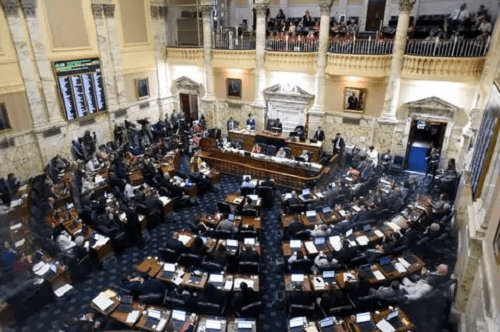
5.24.19 – Baltimore Sun
Maryland lawmakers passed hundreds of bills this year. Here’s a look at which ones became law and which ones Republican Gov. Larry Hogan vetoed.
Members of the legislature, which is controlled by Democrats, can vote to override Hogan’s vetoes when they return to Annapolis in January for the next General Assembly session.
Vetoed bills
- “Ban the box”: Would have limited when employers could discuss a job applicant’s criminal record.
-
Oyster management: Sought to create a new process for developing plans for managing Maryland’s oyster population and regulating the harvest.
- Handgun Permit Review Board: Would have sent appeals of Maryland State Police decisions on permits to carry handguns to administrative judges, rather than a panel of five civilians.
Bills that became law without the governor’s signature
- Foam ban: Bans most foam food and drink containers starting July 1, 2020. Maryland will be the first state to have a ban go into effect.
- Renewable energy: Increasing the amount of electricity in the state that must come from renewable sources to 50% by 2030.
- Drug board: Creating a state board to monitor the prices paid for prescription drugs by insurance plans for state and local government workers.
- Family planning funding: Requiring the state to reject federal federal planning assistance, known as Title X, if it comes with a “gag rule” prohibiting medical providers from discussing a pregnant patient’s options.
- Baltimore Symphony Orchestra: Sending an extra $3.2 million in state aid to the financially struggling symphony.
-
“Blueprint” for education: Sending $855 million in additional funding to public school classrooms over two years.
Bills signed by the governor
- University of Maryland Medical System: Revamping the hospital system’s board after The Baltimore Sun reported that the network had contracts with the companies of nearly a third of the members.
- University System of Maryland: Reforming the Board of Regents and requiring it to operate in a more transparent manner, following controversial actions after the death of Terrapins football player Jordan McNair last summer.
- Tobacco 21: Raising the minimum age to buy nicotine and tobacco products, starting Oct. 1.
- “Easy enrollment” insurance: Adding a question to state tax returns to help find people eligible for Medicaid or subsidized private health insurance.
- Johns Hopkins police: Allowing Johns Hopkins to create an armed police force to patrol its academic, conservatory and hospital campuses in Baltimore.
- Laura and Reid’s Law: Creating enhanced penalties for those convicted of crimes of violence against pregnant women. It’s named for a murdered Howard County teacher and her unborn son.
- Rape kits: Creating a grant fund to help police pay to test evidence from rape kits administered to sexual assault victims.
- Brewery boost: Increasing the amount of beer that breweries can sell in on-site taprooms.
- Water bills: Prohibiting Baltimore from placing liens against homes and houses of worship due to unpaid water and sewer bills.
Bills that became law after lawmakers overrode vetoes
- Minimum wage: Gradually increasing the hourly wage in the state from $10.10 to $15.
- School start date: Allowing local school boards to start the academic year before Labor Day.
- Comptroller’s authority: Moving enforcement of alcohol and tobacco regulations from the Office of the Comptroller to a new agency.
- Oyster sanctuaries: Permanently protecting several no-harvest areas.
